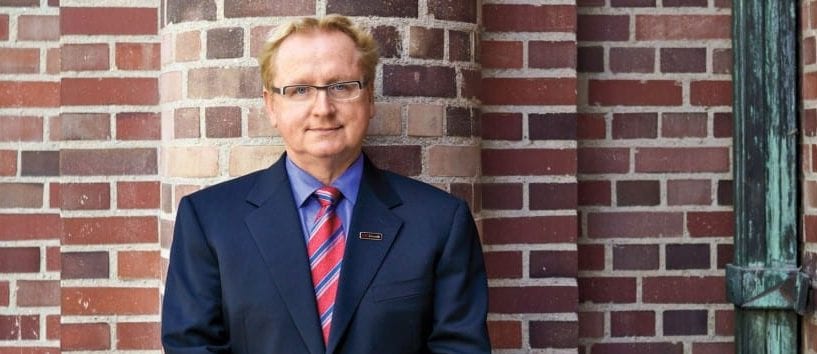As part of our ‘Made in Bristol’ interview series, alumnus Steve Kay (BSc 1981, PhD 1985, Hon DSc 2014) takes us through his journey from Bristol to becoming one of the world’s leading scientists.
My job as a scientist is to come into work each day and see something new in Nature that nobody else has seen before. Engaging the incredible diversity of life that has evolved on this planet makes my hair stand on end some days. Bristol nurtured that awe. I initially went to Oxford to do medicine (and play rugby), but frankly found the classes there rather boring after one term.
I realised I’d gone down the wrong path for me. I wasn’t pursuing my passion. I grew up on the island of Jersey where a myriad of marine creatures would be exposed during very low tides. They fascinated me. One day my elementary teacher brought in a microscope from mainland England and we spent hours with our eyes glued to it, staring at creatures swimming in pond water. That fascination and excitement with natural science couldn’t be matched.
After some reflection, I recalled how much I had enjoyed interviewing with Bristol’s Biochemistry department during campus visits. I contacted the department and entered the following autumn and found it to be absolutely the best place for me – a rigorous curriculum combined with a sense of belonging to an academic family.
I loved it so much, and I am proud to be a “triple” alum. Bristol taught me rigor and discipline in science. Professors like Nigel Brown, Owen Jones and my PhD advisor Trevor Griffiths demanded independent thought (and hard work). But they also valued collaboration and collegiality. These principles have stuck with me throughout my career – how to aggressively pursue the truth, while not taking yourself too seriously.
In terms of opportunity, the USA has a science economy like no other and I was keen to explore new horizons. Over the last 25 years, we have generated a deep knowledge base of how circadian clocks are built and function in a variety of organisms. California remains a hotbed of innovation and a fantastic place to translate our knowledge into products that provide some benefit to mankind. In the case of agriculture, this can be crops that are more resistant to stresses due to climate change. In humans, there is the real possibility of developing drugs that target the clockworks to treat diseases like diabetes and cancer.
If I could give one word of advice to students today it would be to constantly seek out people smarter than yourself to work with. That translated into some wonderful discoveries in my own field, such as identifying many of the key clock genes in plants and humans, that are now relevant to advances in either agriculture or medicine.
I am incredibly grateful to the University for the training and scholarship I received while there, and the memories: walking across the downs in all kinds of weather from Wills Hall to classes every day, (Southern California can make you soft!), picking up cider (“scrumpy”) from our own “Department of Pomology” at the Long Ashton Research station on a Friday afternoon, and meeting the Oxford Dangerous Sports club at a party in Clifton the night before they did the world’s first bungee jump in 1979!
It reminds me that it pays to take a leap into the unknown, to embrace the wrong turns, dust yourself off and get right back in there. Bristol continues to dare to be different, and I very much enjoy staying involved with the University as chairman of the Scientific Advisory Board for BrisSynBio, a world class synthetic biology centre. A good piece of both my heart and brain will always be at the University of Bristol and the wonderful city. Like me, it too is looking for something new, something that nobody else has seen or done before, and that’s an exciting place to be.
______________________
Professor Steve A. Kay (BSc 1981, PhD 1985, Hon DSc 2014) is Director of Convergent Biosciences and Provost Professor of Neurology, Biomedical Engineering and Biological Sciences at the University of Southern California. As one of the world’s top experts on genes and circadian rhythms, he has published more than 200 papers and is named by Thomson-Reuters as a highly cited scientist. He has been cited in Science magazine’s “Breakthroughs of the Year” three times since 1997, and has received numerous awards, including election to the National Academy of Sciences of the USA. Kay has served on the advisory boards to Althea, Bayer AG, Monsanto, Novartis, Toyota Motor Corp and BP, amongst others.

